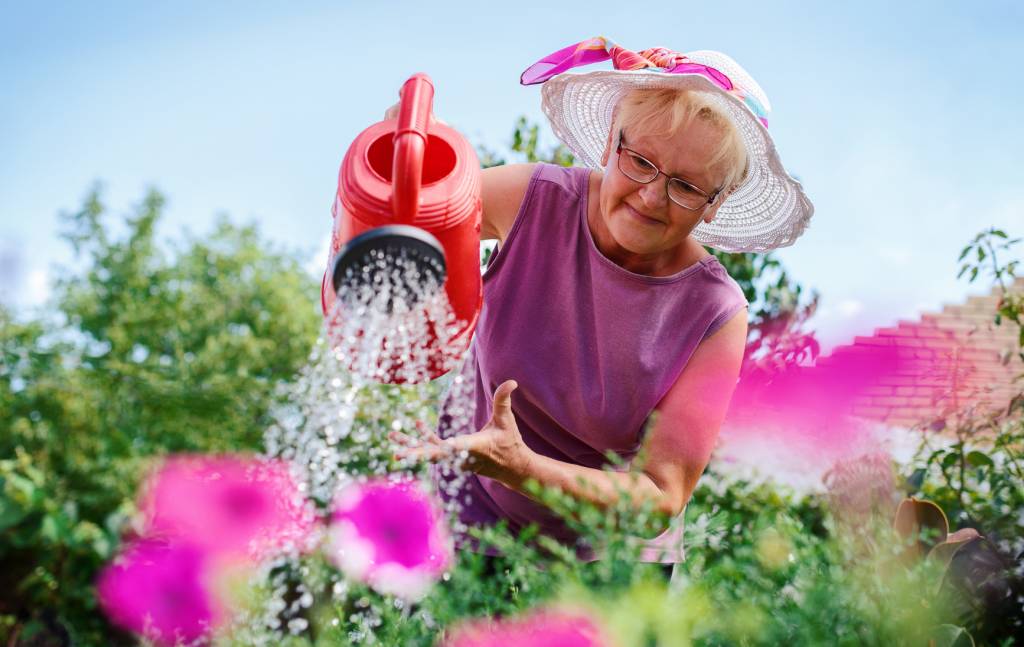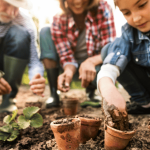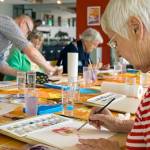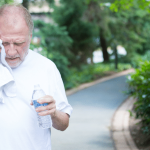Gardening has several therapeutic and health benefits for seniors, but it can be a challenging hobby if your loved one has a physical disability or medical condition. Garden tools, equipment, and beds can be modified to make gardening more accessible for seniors who may have a difficult time gardening.
If you or your aging loved one can find a way to garden safely, we recommend giving it a try because of all the benefits to your health and body.
Health Benefits

Gardening decreases the risk of Alzheimer’s disease and dementia in seniors.
Older people often find gardening beneficial for their health because it involves physical exercise that is enjoyable and burns calories. Gardening helps with flexibility and mobility because it requires pulling, stretching, squatting, and bending. It also improves strength and endurance by encouraging the use of all motor skills.
Spending a few hours of gardening per week will strengthen your muscles and help prevent diseases like osteoporosis. Gardening also decreases the risk of dementia and Alzheimer’s disease in seniors because of the critical thinking skills and physical demands.
Hand-eye coordination increases as a result of gardening and stress declines. This is because hand-eye coordination raises serotonin and lowers cortisol levels, a producer of stress. Gardening promotes relaxation and social interaction in senior citizens that may find themselves stressed and lonely.
Frequent exposure to sunshine will provide vitamin D but be careful not to overdo it. Gardening promotes interest in nature and provides mental stimulation for senior citizens.
Health Considerations
Elderly people may suffer from physical or mental conditions that make gardening a difficult hobby to enjoy. These conditions include the following:
- Loss of peripheral vision and poor eyesight
- Thinning, fragile skin is more sensitive to sunburn, bruises, and bumps
- Body temperature changes can lead to susceptibility to heat exhaustion or dehydration
- Memory abilities, thinking, and general mental health affected by dementia
- Arthritis and osteoporosis may restrict flexibility and movement
Health Precautions
It is healthy for older people to be outside but staying out for long periods of time can be hazardous. However, there are many precautions you can take to reduce your risk of heatstroke or other weather-related conditions.
Garden in the morning or late afternoon to prevent frequent sun exposure. Be sure to apply sunscreen regularly to avoid serious sunburns from ultraviolet rays. The proper attire for safe and effective gardening is lightweight clothing that covers exposed skin, a hat, gardening gloves, and protective shoes.
Secure fences and gates to keep wild animals away and to prevent an accident if you or your loved one has memory loss and is prone to wandering. Ensure that walkways and paths are flat and will not cause slipping.
If you experience any bruises, cuts, or other injuries while gardening, tend to them immediately. Keeping a First Aid kit close will be helpful for this purpose. Handle power tools and garden equipment safely and store them in a safe, secure place.
Perhaps the most important precaution is to understand your limits before you begin gardening. Take frequent breaks, especially during a hot day, and drink water or juice to stay hydrated. Avoid alcohol in this situation.
Contact Us
Gardening causes many health benefits in seniors and is an excellent way for them to spend extra free time. Studies show that gardening improves physical and mental wealth by encouraging senior citizens to exercise both their bodies and brains. It is also a great way for them to get involved in their community and socialize.




